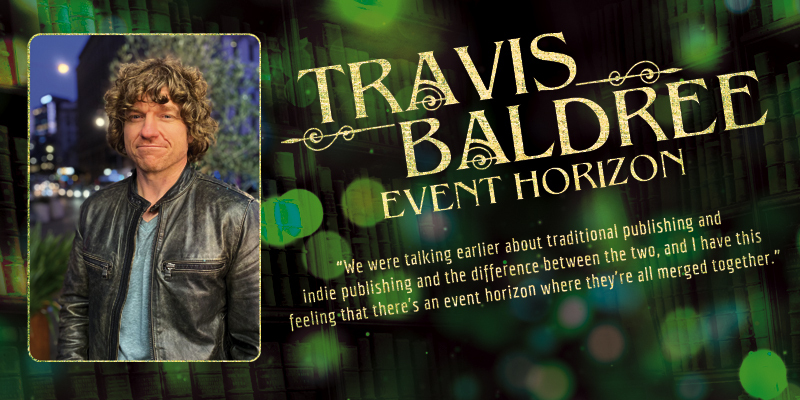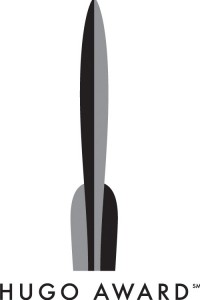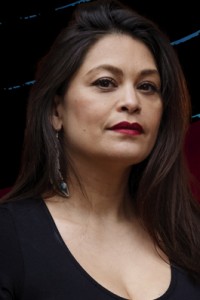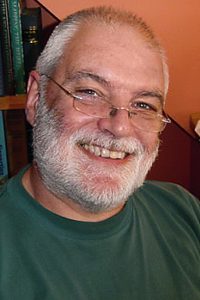Travis Baldree: Event Horizon
TRAVIS WAYNE BALDREE was born March 28, 1977 in Nacogdoches TX and grew up on a dairy farm. In fourth grade, his family moved to Washington State, and he attended Washington State University briefly before dropping out to work in tech, primarily as a software engineer and video game developer. He cofounded game companies including Runic Games and Double Damage, and is best known for creating the Torchlight and Rebel Galaxy games. In his early forties, he retired from game development to work full-time as an audiobook narrator.
In 2022, Baldree self-published his debut novel Legends & Lattes, ‘‘A Novel of High Fantasy and Low Stakes,’’ to great acclaim; the book was instrumental in popularizing the current cozy fantasy trend. Later that year he resold the book to Tor and Tor UK, and it subsequently became a New York Times bestseller and was nominated for Locus, Hugo, and Nebula Awards. A prequel, Bookshops & Bonedust, appeared in 2023, and a further volume in the series is forthcoming, along with unrelated novels.
Baldree won the Astounding Award for Best New Writer in 2023. He lives in Spokane WA.
Excerpt from the interview:
“I started writing during COVID lockdown. The content of Legends & Lattes was definitely influenced by that, because the type of things I wanted to read and consume were very different. Like, before COVID, I really enjoyed watching Games of Thrones. During COVID, I didn’t want to watch any characters I liked get beheaded. I wanted to watch The Great British Bake Off, and I watched a lot of Fixer Upper. I wanted to feel okay, because it seemed like the world was just hanging fire. I didn’t need to escape with something dire – I needed to escape with something that was not what I was experiencing. That definitely informed the kind of thing I thought I wanted to write, because I never would have attempted to write something like Legends & Lattes before.
“The book started as a joke. As a narrator, I work live. I have a Discord server where people hang out while I work. I read a lot of the same kind of stuff, because you very quickly get typecast in audiobooks unless you make a lot of effort to push beyond that. I read a lot of fantasy action-adventure books, and the newer genres of LitRPG and things like that. Lots of power fantasy, with super high stakes. The protagonist is invariably some white guy, age 24, and there’s probably a snarky sidekick, and there’s some cheerleading love interest. There’s a certain amount of formula to a lot of it. There are a lot of really great books written inside that formula, or breaking just outside it, but there’s still a formula, and I read a lot of them. I just wanted to read something else, so I was joking in my Discord that what I really wanted was to have a Hallmark movie set in the Forgotten Realms – I wanted something where I felt okay after I was done reading it.
“Occasionally, I get the chance to read a fantasy romance, and I really enjoy them. I don’t get cast for them much, because they are usually not a male protagonist, so they’re pretty thin on the ground as options for me. But when I did get them, it was just so pleasant. I felt good after I read them, and I wanted that. So November rolled around, and one of my fellow narrators – who also turns out to be my writing buddy – Aven Shore-Kind, convinced me to take another crack at NaNoWriMo. We had tried to do it the previous year and we both tapped out. But she said, ‘Let’s try it again.’ And I said, ‘I will if you write a book, too.’ She said, ‘Okay.’
“I remembered my ridiculous idea from my Discord server a month prior, and thought, ‘I’ve failed writing a book so many times in the past, and I always feel bad afterward. I had these good ideas and I couldn’t make them come to fruition. So I’ll choose this stupid idea so I won’t feel terrible when I don’t finish.’ The other thing that changed for me was, instead of assuming I was a pantser – which is what I really wanted to be – I thought, ‘I’m going to try outlining it, and try and get to the end.’ I outlined the book, and that was the first time I’d ever done that. That turned out to be what I needed. I think there were some specifics to the way that I outlined that worked for me: I did the outline as a short form of telling the story, so it was written in plain English for each chapter, with a summarization of what happened, like you’re sitting at a table telling someone the plot of a book, as opposed to a bullet list of events that you have to piece together later. That organized a lot of things in my mind. Plus it’s a ridiculously simple book, so I could hold it all in my brain: ‘I’m getting from here to here, and it’s clear how I’m going to get there, and I can make this work.’ I wrote it in 26 days – I finished a couple days before the end of November, and it’s basically The Book.
“I like to learn how to do things. I get a big dopamine hit, especially from the first part of the curve of getting good at something, where you make a lot of big improvements in a small amount of time. The last five percent is really boring, but that first bit is really great.
“The decision to self-publish Legends and Lattes was driven by two things. One, I finished the thing, and, by God, I was going to make it so I could get a paperback copy. The second was that I work with all of these authors that independently publish, and I had a lot of curiosity about what they went through: How did that work, how did you get it done? I figured that I would just go through the process. I have an author that I narrate for who has a background in editing, who’s really good at it, so I bartered with her. I said, ‘I’ll narrate a book for you for free if you edit my book. We’ll go through the full editorial process.’ In the meantime, a lot of things came in handy from having been a game developer and someone who produces creative work on a timeline, because that’s what game development is: You’re solving problems that you haven’t solved before with a finite amount of resources and time, and you have to deliver, or you’re out of a job. But it’s still creative work that is ultimately about entertaining somebody else, and so it threads the needle between commerce and art. That experience is very useful when you’re writing a book and trying to publish it because when you’re writing, you’re kind of solving a problem that no one has solved before. This book hasn’t existed before in this form. I need to do it, I need to do it in a reasonable period of time, and I would like the people who read it to enjoy it. It is a kind of a puzzle, so it’s a problem-solving exercise.
“I enjoyed doing all of that. I really like editing. I think if I was a pantser, maybe I wouldn’t. But because the book is reasonably well-organized by the time it’s written, and because I’m pretty anal retentive about not building on top of ‘bugs’ (going back to a tech background), I try to make sure the book is stable as I’m writing it. I know a lot of people say, ‘Oh, gosh, the problems are piling up – but that’s a problem for a later me.’ I’m not that way. If I discover there’s a logical problem in Chapter Ten that has to be resolved in Chapter Two, I immediately go back to Chapter Two and fix it, because the idea of building more things on top of this shaky foundation is not for me. I’m hardwired not to do that, because if you do that in software engineering, you’re really screwed.
“That’s great for the editing process because it becomes more about word choice and redundancies and really looking at how you can elevate certain parts of the story, or things you might not have addressed well enough. So when we edited Legends & Lattes, we edited out 2,000 words and put 2,000 words back. It’s 63,000 words long, which is about what it was when I finished writing it. It’s a brisk little book, and it’s exactly what it says it’s going to be.
“I started writing Legends & Lattes on November 1, and it was published on February 22 of the following year, so it was a fast turnaround, which I like. That’s one of the huge advantages of being an indie – you can roll the dice incredibly fast. If you make a book and it doesn’t work, you can just write another book. You don’t have to wait a year and change, or two years, until it comes out to see if anybody responded to it. You just keep going. The process was largely smooth. I managed to put together a solid book that was edited well, and it had a good cover, and it’s reasonable to say that, as far as those things go for an indie book, it blew up. I didn’t have anything to do with that from a marketing or mechanical standpoint after the completion of the book – that was all the work of other people. The combination of the cover and the tagline and the pitch articulated really well what the book was. It is what it says it is; it doesn’t try to be anything else, so if you show it to somebody on TikTok, or Instagram and say, ‘This is what this book is about,’ and then they read it, they say, ‘Oh, yes – that is indeed what that book is about. I enjoyed that, too, and I got what I wanted, so now I am going to show it to somebody else.’ It unintentionally worked well to spread in that way.
Interview design by Francesca Myman
Read the full interview in the June 2024 issue of Locus.
 While you are here, please take a moment to support Locus with a one-time or recurring donation. We rely on reader donations to keep the magazine and site going, and would like to keep the site paywall free, but WE NEED YOUR FINANCIAL SUPPORT to continue quality coverage of the science fiction and fantasy field.
While you are here, please take a moment to support Locus with a one-time or recurring donation. We rely on reader donations to keep the magazine and site going, and would like to keep the site paywall free, but WE NEED YOUR FINANCIAL SUPPORT to continue quality coverage of the science fiction and fantasy field.
©Locus Magazine. Copyrighted material may not be republished without permission of LSFF.








